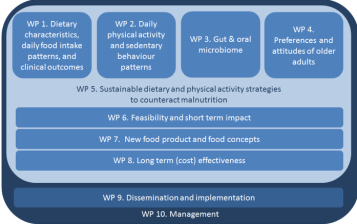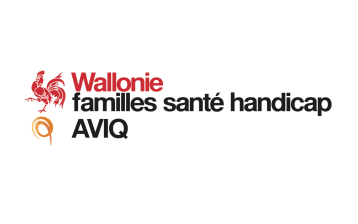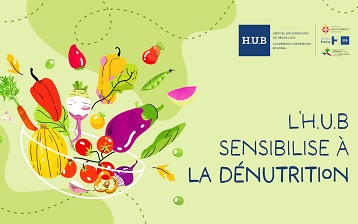
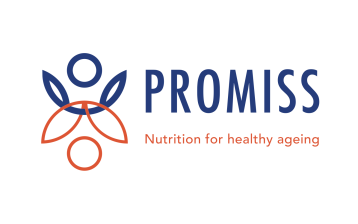
PRevention Of Malnutrition In Senior Subjects in the EU
PROMISS (PRevention Of Malnutrition In Senior Subjects in the EU) is a multi-country project aiming to turn the challenge of tackling malnutrition in community-dwelling older persons into an opportunity for healthy ageing for the future.
The PROMISS consortium contains worldwide expertise in epidemiology, clinical trials, geriatrics, nutrition, physical activity, microbiomics, as well as in behaviour, consumer, sensory and computer sciences. It builds on strong collaborations with food industry and SMEs to strengthen innovation of the European agri-food sector and their market position. Existing data from scientifically well-established prospective ageing cohorts and national nutritional surveys from Europe and ‘third countries’ will be combined with new data from short- and long-term intervention studies in older persons at risk. Its holistic approach will provide insight in the causality of the links between diet, physical activity, appetite and malnutrition and underlying pathways, thereby providing the necessary evidence to develop optimal, sustainable and evidence-based dietary and physical activity strategies to prevent malnutrition and enhance active and healthy ageing.
PROMISS will also deliver food concepts and products as well as persuasive technology to support adherence to these strategies. The dietary and physical activity strategies and food products will be specifically developed with older user involvement to meet the needs and fit the preferences of older consumers. In close collaboration with stakeholders, PROMISS will translate these strategies into practical recommendations to guide policy and health professionals at EU- and Member States level. Dissemination and implementation takes place through strong dissemination partners operating on a European level and linked to national networks across Member States. PROMISS promises prevention of malnutrition, additional healthy life years and strengthening of EU’s food industry.
Work packages
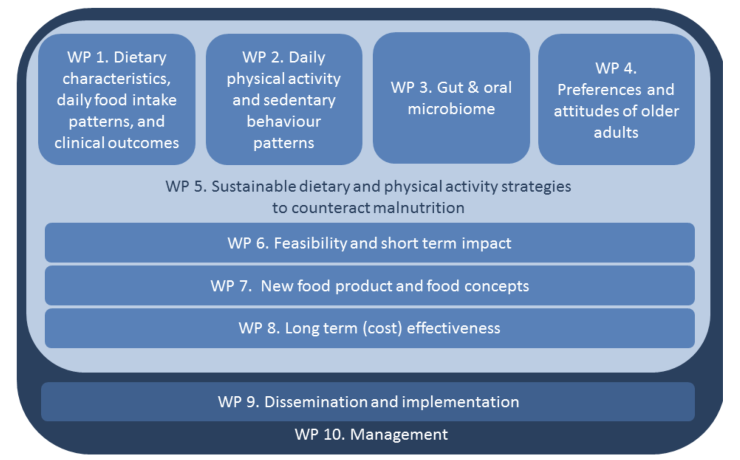
PERT diagram showing the overall relationship of work packages of the PROMISS project
First results
- Older adults with a poor appetite consumed less protein and dietary fiber, less solid foods, smaller portion sizes, less wholegrains, and less fruits and vegetables than older adults with a very good appetite. They consumed more dairy foods, fats, oils, sweets and soda’s. (van der Meij et al. 2017)
- Of those aged 85 years and older, 28% were below the commonly used protein intake target (0.8g of protein per kg of adjusted body weight per day). This group ate less meat, more cereals and drank more non-alcoholic beverages than those who had adequate protein intake. (Menonҫa et al. 2017)
- Older adults with a lower protein intake seem to be at greater risk of developing mobility limitations over 6 years. (Houston et al. 2017)
- Low protein intake may negatively affect muscle strength and physical performance in late life, and a combination of adequate protein intake and physical activity may be necessary to reduce the loss of muscle strength in the very old. (Granic et al. 2017)
- Higher protein intake may lower the risk of developing chronic protein-energy malnutrition in community-dwelling older adults. (Hengeveld et al. 2018)
- The Protein Screener 55+ (Pro55+) was developed and validated to screen for low protein intake in community-dwelling older people. An online version is available for researchers and can be found at www.proteinscreener.nl. (Wijnhoven et al. 2018)
- Four different disability trajectories were identified between the ages of 85 and 90: 1) a constant very low disability trajectory (difficulty with none or 1 ADL) over the 5 years; 2) a low disability trajectory (difficulty with 2 ADLs) that steadily progressed to mild disability (5 ADLs); 3) a mild disability score (4 ADLs) at 85 that increased to moderate disability (10 ADLs) by age 90; and 4) a moderate disability score (9 ADLs) that progressed to severe disability (14 ADLs) after 5 years. Those with higher protein intake, especially those at or above 1 g per kg of body weight per day (70g of protein per day for a 70 kg person), were less likely to develop disabilities. (Menonҫa et al. 2018)
25 Partners
Vrije Universiteit Amsterdam, Haskoli Islands University Iceland, University of Newcastle Upon Tyne United Kingdom, National Institute for public health and the environment The Netherlands, Syddansk Universitet Denmark, Goeteborgs Universitet Sweden, Netherlands Organization for Applied Scientific Research the Netherlands, VIVES University College Belgium, Ghent University Belgium, HAS University of Applied Sciences the Netherlands, Kellogg Management Services United Kingdom, Laboratoires Grand Fontaine Spain, Fonterra the Netherlands, Blonk Consultants the Netherlands, Frigilunch Belgium, Henri BV Belgium, University of Helsinki Finland, The European Federation of the Association of Dieticians the Netherlands, European Society for Clinical Nutrition and Metabolism Luxemburg, European Geriatric Medicine Society Belgium, Friedrich-Alexander-Universitaet Erlangen Nuernberg Germany, AGE platform Europe AISBL Belgium, Université de Sherbrooke Canada, Amsterdam AMC – location VU University Medical Center, HAN University of Applied Sciences the Netherlands.
Contact & information
Please visit our website: www.PROMISS-vu.eu
Twitter: @PROMISS_VU
Facebook: @promissproject
Email: PROMISS.po@vu.nl

